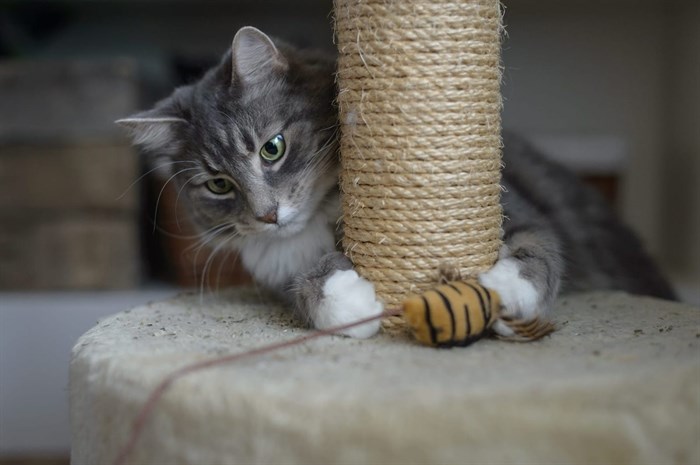
A joint study by the B.C. SPCA and University of British Columbia found no increase in cat intake to shelters after declawing was banned in B.C.
Image Credit: SUBMITTED/B.C. SPCA
September 14, 2021 - 6:00 AM
A joint study by the B.C. SPCA and University of British Columbia found no increase in cat intake to shelters after declawing was banned in B.C.
Researchers set out to uncover whether the declawing ban would lead to an increase in pet owners relinquishing their cats to shelters, but found no significant change in surrendered cats since 2018 when the ban was announced.
“We wanted to perform a formal, peer-reviewed analysis so we could answer the question that has been asked so many times: does a declaw ban cause more cats to end up in shelters or be euthanized? And 74,587 cats in B.C. have spoken: it does not.” Dr. Emilia Gordon said in a press release issued Sept. 13.
Dr. Gordon is the senior manager of animal health for the B.C. SPCA and collaborated with the animal welfare program at UBC to analyze shelter data. Researchers poured over six years of data which showed reasons why pet owners surrender their animals to shelters.
READ MORE: Kamloops restaurant owner in lose-lose situation with B.C. COVID-19 vaccine card
Of the nearly 75,000 cats surrendered in B.C. in those six years, just 50 were because of "destructive behaviour," commonly attributed to clawing, but there was a small increase after 2018.
From May 2015 to April 2018, 22 cats were surrendered due to destructive behaviour, while 28 cats were surrendered from May 2018 to April 2021. Researchers said that change was not statistically significant.
“For two decades the B.C. SPCA has been on record opposing procedures such as declawing, tail docking, ear cropping, and devocalization... so we were thrilled when the ban was announced,” Dr. Gordon said. “But opponents of declawing bans often voice concerns that it could lead to greater relinquishment of cats to animal shelters and we wanted to understand if these concerns were warranted.”
In fact, the vast majority of pets are surrendered for other owner-related reasons, according to a separate 10-year study by B.C. SPCA.
READ MORE: B.C. police dog Chip to be honoured on 25th anniversary of his ultimate sacrifice
The B.C. SPCA study found that nearly 83% of cats surrendered in the province were due to reasons like housing, human health or financial challenges, adding that most of those pet owners would keep their animals if supports were available.
“We hope this data can be used by veterinarians, veterinary regulators, animal shelters, and community members to support bans against unnecessary and painful cosmetic surgeries and to begin discussions about how we address the systemic issues in our society that separate families from their pets,” Dr. Gordon said in the release.
When the College of Veterinarians of B.C. joined Nova Scotia in 2018 by banning declawing, they were the first of seven provinces to later ban the operation.
READ MORE: How gearheads once convinced Kamloops to let them drag race on a city street
To contact a reporter for this story, email Levi Landry or call 250-819-3723 or email the editor. You can also submit photos, videos or news tips to the newsroom and be entered to win a monthly prize draw.
We welcome your comments and opinions on our stories but play nice. We won't censor or delete comments unless they contain off-topic statements or links, unnecessary vulgarity, false facts, spam or obviously fake profiles. If you have any concerns about what you see in comments, email the editor in the link above.
News from © iNFOnews, 2021